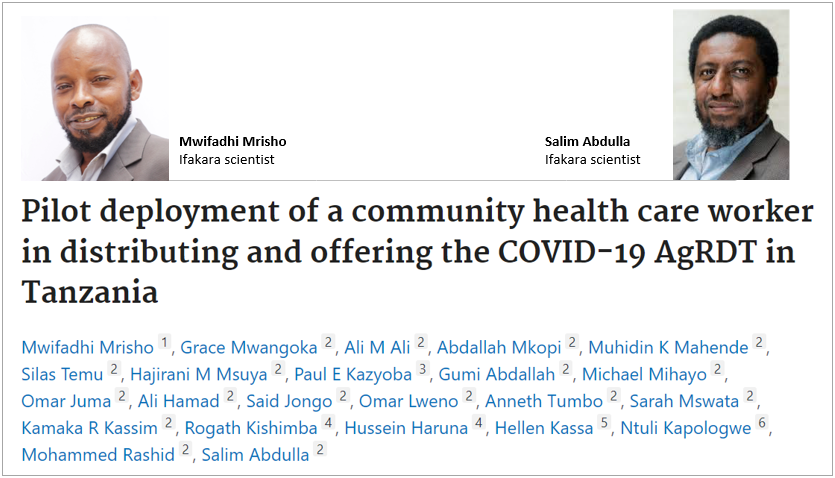
COVID-19: Study confirms a rapid self-test is feasible, affordable

In a groundbreaking study, scientists from Ifakara Health Institute and partners have found that a majority of Tanzanians are ready to use a COVID-19 rapid self-test and are overwhelmingly willing to pay for it if not free.
The study aimed to assess the feasibility, acceptability, and uptake of the COVID-19 antigen rapid diagnostic test (AgRDT) in Tanzania.
Published on May 22, 2024, in Nature's Scientific Reports journal, the study covered a 7-month pilot from March to September 2022 in Dar es Salaam. Community health workers distributed the tests to 1,039 participants suspected of having COVID-19.
Overwhelming support for the self-test kit
The AgRDT detects SARS-CoV-2 antigens in respiratory samples. The study showed overwhelming support: 99.6% of participants were willing to take the test and wait 20 minutes for results; 87.3% felt comfortable with the test; and 99.0% were likely to recommend it to friends. Regarding cost, 83.1% were willing to pay for the test if not free.
The scientists concluded that the COVID-19 AgRDT test is widely accepted. “The involvement of trained community healthcare workers facilitates easy screening of potential cases and early treatment.”
This finding, the scientists say, underscores the potential of self-testing as a viable strategy in the ongoing fight against COVID-19 in Tanzania. “AgRDT deployment for detection and decision-making in Tanzania is a feasible, acceptable, and cost-effective approach in the fight against COVID-19,” they comment.
Ifakara scientists behind this study
The study was spearheaded by Ifakara scientists, with Dr. Mwifadhi Mrisho serving as the lead author and Dr. Salim Abdulla supervising the project.
The team comprised several contributors, all from Ifakara, including Grace Mwangoka, Ali Ali, Abdallah Mkopi, Muhidin Mahende, Silas Temu, Hajirani Msuya, Gumi Abdallah, Michael Mihayo, Omar Juma, Ali Hamad, Said Jongo, Omar Lweno, Anneth Tumbo, Sarah Mswata, and Kamaka Kassim.
Ministry of health, NIMR, FIND involved
Key collaborators included Paul Kazyoba from the National Institute for Medical Research (NIMR); Rogath Kishimba and Hussein Haruna from Tanzania's Ministry of Health (MoH); and Hellen Kassa from FIND - Campus Biotech in Geneva. Ntuli Kapologwe from the Department of Health, Social Welfare, and Nutrition Services in the President’s Office Regional Administration and Local Government (PORALG) Tanzania also played a significant role.
The Foundation for Innovative New Diagnostics (FIND), based in Geneva, Switzerland, provided funding for this groundbreaking work.
More: Antigen tests – the likes of AgRDT
Antigen tests are immunoassays that detect the presence of a specific viral antigen, indicating a current viral infection. They are commonly used to diagnose respiratory pathogens, including influenza viruses and respiratory syncytial virus (RSV).
Want to explore more on these groundbreaking results? Do it here.
